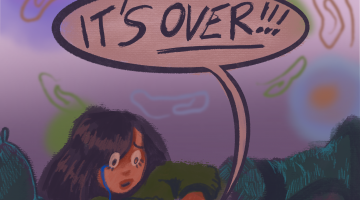Social media is the demise of meaningful human communication.
Friends used to write each other letters, but now they just share videos on Facebook Messenger. Presidents used to give speeches, but now they just tweet fragments and adjectives. Self-worth used to be measured in respect from peers, but now it’s measured in likes from strangers.
Social media is a drug for your ego (see @realdonaldtrump). We derive pleasure from likes and views, and they keep us coming back for more.
I admit, social media can be a useful tool. It’s an effective way to communicate instantaneously with anyone in the world and it’s a great platform to share ideas and have arguments; however, most people don’t use social media in this way.
Instead, we use it to share selfies, fake news and cartoon versions of ourselves.
Yes, we can communicate more information thanks to technology, but more information doesn’t mean better information. There are booming businesses in some Eastern European countries based solely on writing fake news that we will share on Facebook.
Mark Zuckerberg, CEO of Facebook, recently released an essay outlining the future of social media as he sees it. He hopes to create a global community on the Internet where we participate in everything from politics to information to civic engagement.
Zuckerberg says, “In times like these, the most important thing we at Facebook can do is develop the social infrastructure to give people the power to build a global community that works for all of us.”
What language do we speak in this global community? Right now, we talk to each other with likes, shares, screenshots, swipes, memes, gifs and dog ear filters. Personally, I’d rather speak English.
What if Romeo sent Juliet a text and she liked it but didn’t respond? What if Charlie Chaplin was content with being Vine famous and never made movies? What if Abraham Lincoln decided to keep the Union intact based on a Twitter poll?
This cannot be the only way we talk to each other, and it definitely has no place in politics.
Zuckerberg points out that in recent elections around the world candidates with the most engaged Facebook following have won. He thinks the same place where we get stuck watching hours of street fighting videos should decide who holds our highest positions of power.
In my opinion, politicians shouldn’t even be allowed on social media. The most substantive arguments that happen on the Internet are Reddit threads about whether Saving Private Ryan or The Thin Red Line is the better World War II movie from 1998.
Real decisions can’t be made in 140 characters or less using hashtags and emojis.
Public opinion can’t be measured with likes. A step in the right direction might be a button that says “I like this post because…”
Social media has its perks. That groovy new disco emoji is the tits. I don’t hate social media and I don’t hate people who use social media constantly (except you @kehoefromreno). But I do hate the fact that social media has taken over the way we communicate, and people like Zuckerberg want to move everything we do onto social media to profit one company.
“Social infrastructure,” as Zuckerberg calls it, should involve real, meaningful words, not a little cartoon thumbs up.










